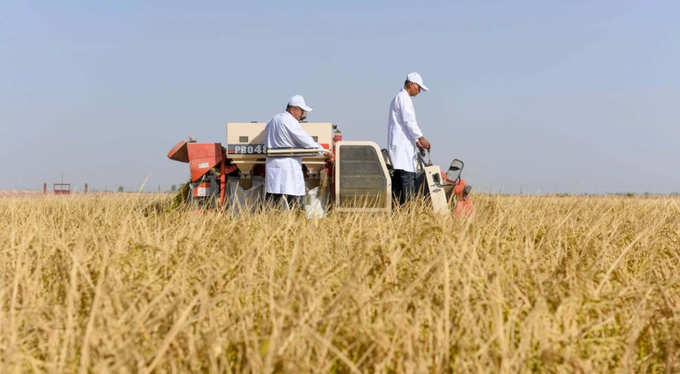June 20, 2025 | 06:37 GMT +7
June 20, 2025 | 06:37 GMT +7
Hotline: 0913.378.918
June 20, 2025 | 06:37 GMT +7
Hotline: 0913.378.918

As China seeks new areas for viable farmland, it has performed frequent tests of new methods in the Xinjiang region. Photo: Xinhua
The experiment - the first successful test of this technique in a climate-controlled environment in the desert - paves the way for the quick cultivation of crops in sandy areas year-round, state broadcaster CCTV reported on Sunday.
The achievement has been trumpeted widely as part of China's efforts to enhance self-sufficiency in food, a national priority as climate change worsens and global trade fluctuates rapidly. Attempts to grow crops in barren or abandoned zones are becoming more commonplace, as the country has a smaller portion of the world's arable land compared to its share of the global population.
Do you have questions about the biggest topics and trends from around the world? Get the answers with SCMP Knowledge, our new platform of curated content with explainers, FAQs, analyses and infographics brought to you by our award-winning team.
Supported by soilless farming, temperature control and artificial lighting, the trial - which took place in Hotan, a prefecture in the southwest of the Xinjiang Uygur autonomous region - saw a traditional rice variety ready for harvest just 60 days after seedlings were planted, researchers from the Chinese Academy of Agricultural Sciences told CCTV.
With ordinary farming practices, this process would take 120 to 150 days in major rice-growing areas in the country's south or northeast.
Growth at this speed had already been observed in laboratory settings as early as 2021, but success in the Xinjiang trial carries import for wider application as it costs less to build and equip facilities there, the region has longer daylight hours and the temperature differences between day and night are more stark.
Yang Qichang, the project's leader and a chief scientist from the academy's Institute of Urban Agriculture, said the structures his team built in Hotan cost 350 yuan (US$48) per square metre, a third of what glass greenhouses from the Netherlands - an industry leader - would cost.
The Hotan structures also consume a quarter of the energy that a standard Dutch glass greenhouse does, he said.
"After future integration with new energy, mechanisation, and intelligent technologies, construction and operating costs will be greatly reduced," Yang said. "Such greenhouses will be strongly competitive."
Novel farming methods are being tested more frequently in the Xinjiang region as Beijing looks to expand food production into more areas.
In October, researchers announced a large experimental field at the edge of the Taklimakan Desert planted with a salt-tolerant variety of rice had a much higher yield than salt-tolerant rice grown elsewhere.
Just two months before that, official media reported a technological breakthrough in seawater aquafarming in the region, with freshwater fish, king prawn, abalone and lobsters grown at a local fishery.
As cotton had traditionally accounted for the bulk of agricultural production in Xinjiang, rice was rarely planted due to a lack of water, with food crops mostly limited to wheat and corn.
But less cotton has been grown there since the US' Uygur Forced Labour Prevention Act went into effect in 2022, with production of grain in Xinjiang increasing by over 16 per cent in 2023 compared with a year earlier according to government data.
(SCMP)

(VAN) Poultry production in Poland, which has only started recovering from devastating bird flu outbreaks earlier this year, has been hit by a series of outbreaks of Newcastle disease, with the veterinary situation deteriorating rapidly.

(VAN) Extensive licensing requirements raise concerns about intellectual property theft.

(VAN) As of Friday, a salmonella outbreak linked to a California egg producer had sickened at least 79 people. Of the infected people, 21 hospitalizations were reported, U.S. health officials said.

(VAN) With the war ongoing, many Ukrainian farmers and rural farming families face limited access to their land due to mines and lack the financial resources to purchase needed agricultural inputs.

(VAN) Vikas Rambal has quietly built a $5 billion business empire in manufacturing, property and solar, and catapulted onto the Rich List.

(VAN) Available cropland now at less than five percent, according to latest geospatial assessment from FAO and UNOSAT.

(VAN) Alt Carbon has raised $12 million in a seed round as it plans to scale its carbon dioxide removal work in the South Asian nation.